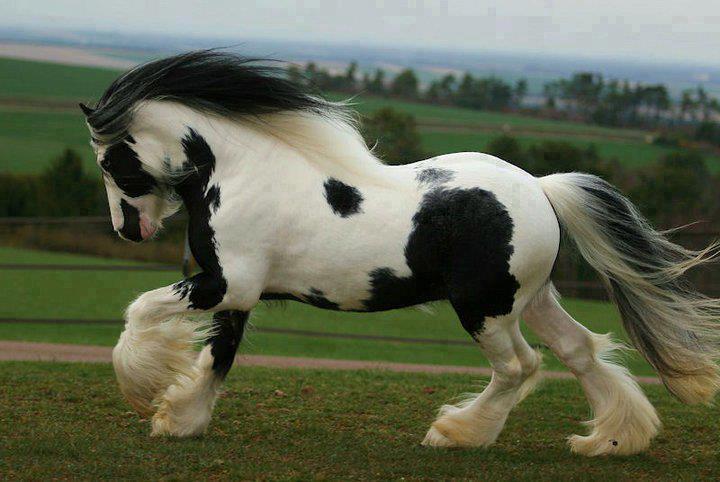

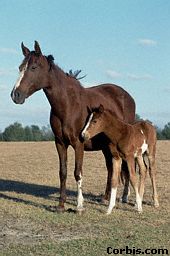
THE WILLFUL BOY.
PHIL sat by the cottage window with his lips in a terrible pout. What could be the matter? Why, his mother had gone down the street to see a neighbor, and had left him to take care of his baby sister. Now, Phil meant to have sailed his little boat on the pond just below the garden, and he was very angry to think that his sport was spoiled. He was not willing to give up anything for the dear mother who had done so much for him.
"I won't take care of her, any way," muttered Phil to himself. "If I can't sail, my boat, I'll read my new book." So the naughty boy took his book, and soon forgot all about his sister.
She came and climbed up by his knee, but he pushed her off rudely. She stared at him with grieved, wondering eyes, and then went away.
Presently, with short, uncertain steps, she tottered to the door. She could just walk alone. Slowly she crept out and down the steps into the garden. Through the garden she toddled, her little feet seeming to carry her straight to the pond. Oh, will not Phil look up? No; he is too much engaged with his book to pay her any attention. Then she came to the very edge of the water, and looking in saw a pleasant, round face, encircled with little rings of light hair.
Pretty baby! Carrie stretched out her hands. Alas! Alas! There was a quick splash and a scream! But help is near; not brother Phil, but the old family horse, Prince. See how carefully he takes her up by her clothes and carries her out.
Our artist has given us a very good picture of the sight that met the eyes of mamma, who was just returning home, and of Phil, who, having heard Carrie scream, rushed out to see what was the matter.
As mamma clasped her baby in her arms, oh, how thankful she felt to the faithful old horse! But I cannot tell you how bad she felt, to think that her little boy had been so naughty. Phil was truly sorry, and deeply repented, asking God's forgiveness. He never forgets that through his disobedience his little sister nearly lost her life, and that to the faithful old Prince he owes a debt of gratitude.
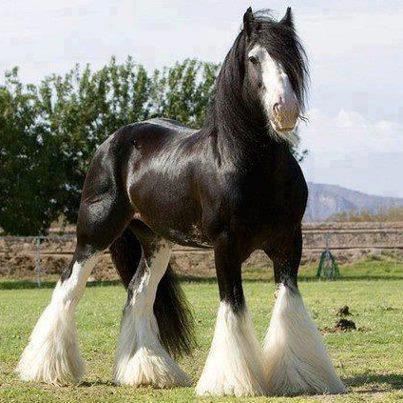
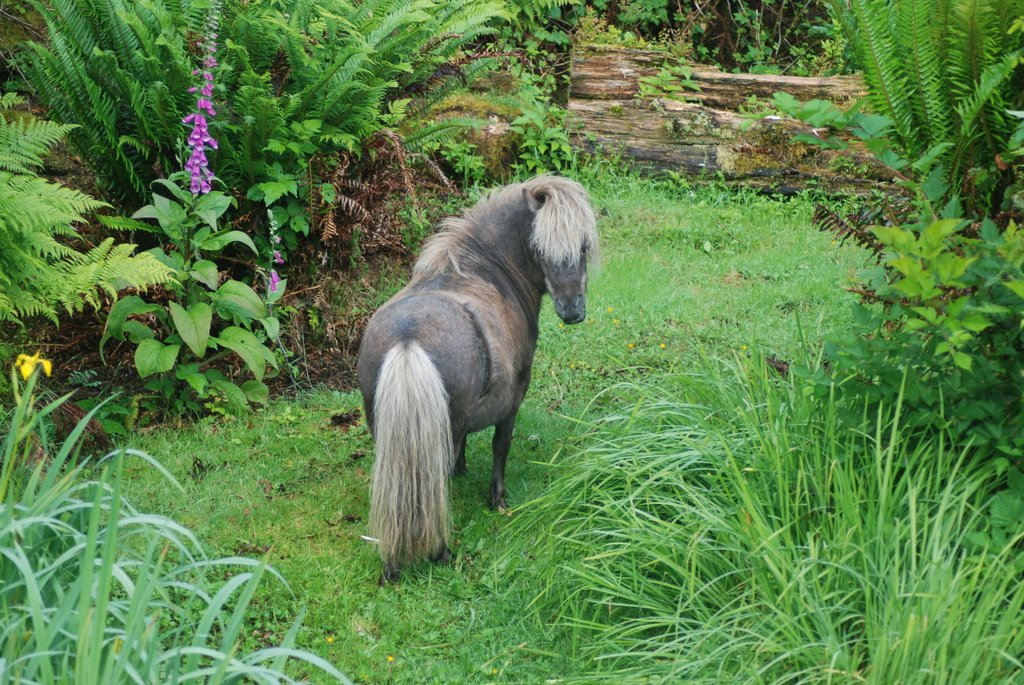
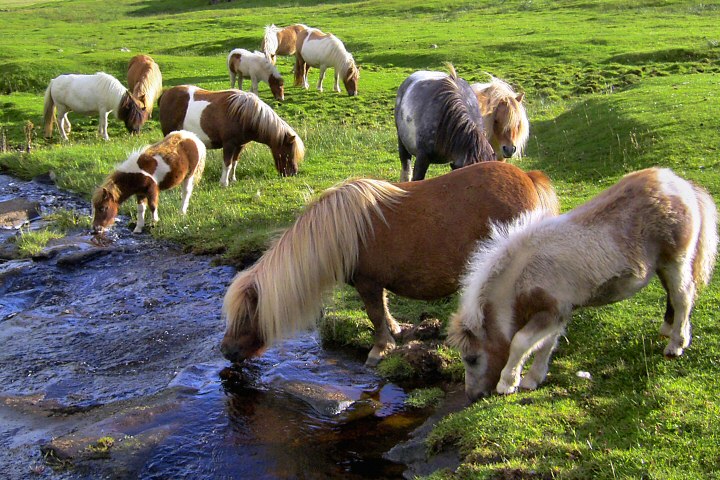
a handful of hay or straw may be
given them once in two or three days.
The ponies then live chiefly by
eating the drift-weed that is thrown up on the beach.
The Myrtle.
making excuses. If you have done
wrong, be willing to confess it. Do not
try to hide it, or throw the blame on another. A person who is quick at making excuses is not likely to be good at anything else. Be honest, be frank, be truthful.
Look at the good habits of the pony!!
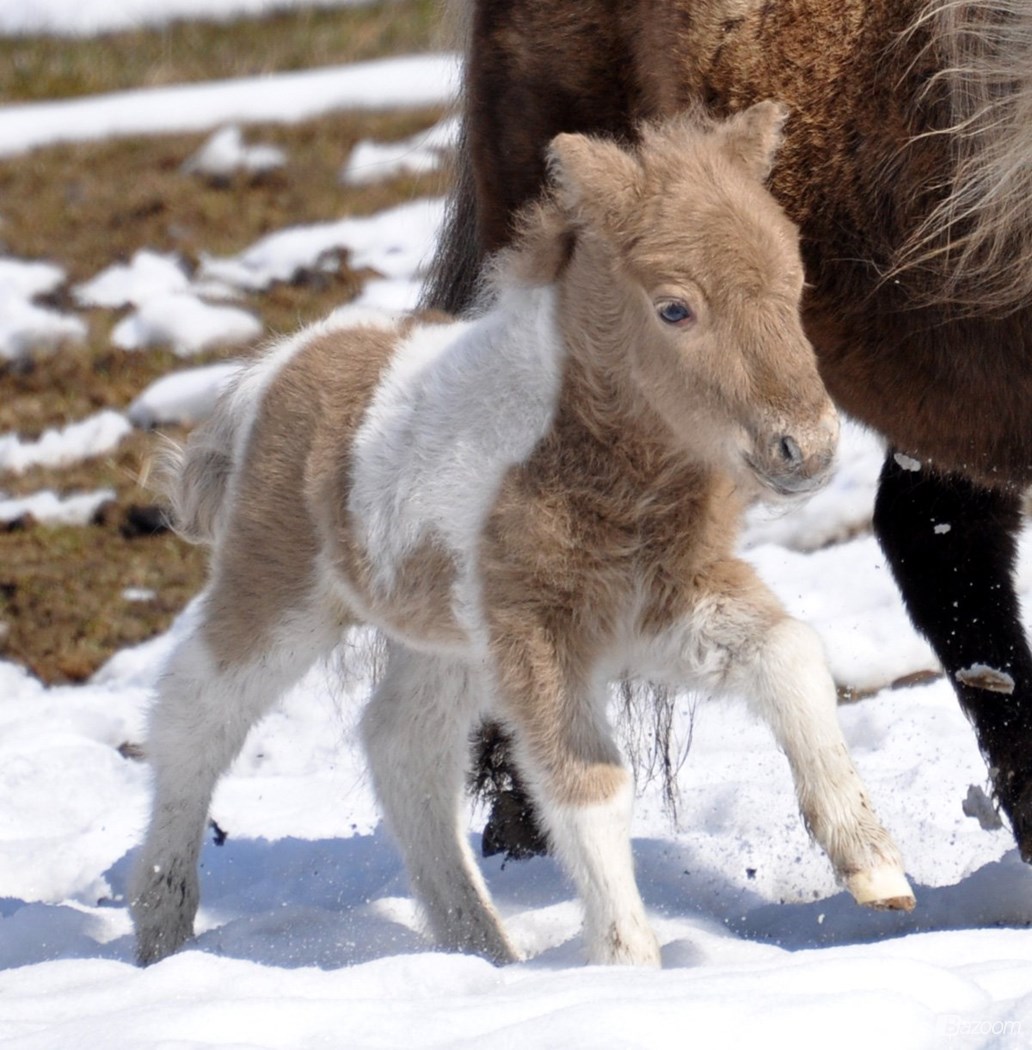
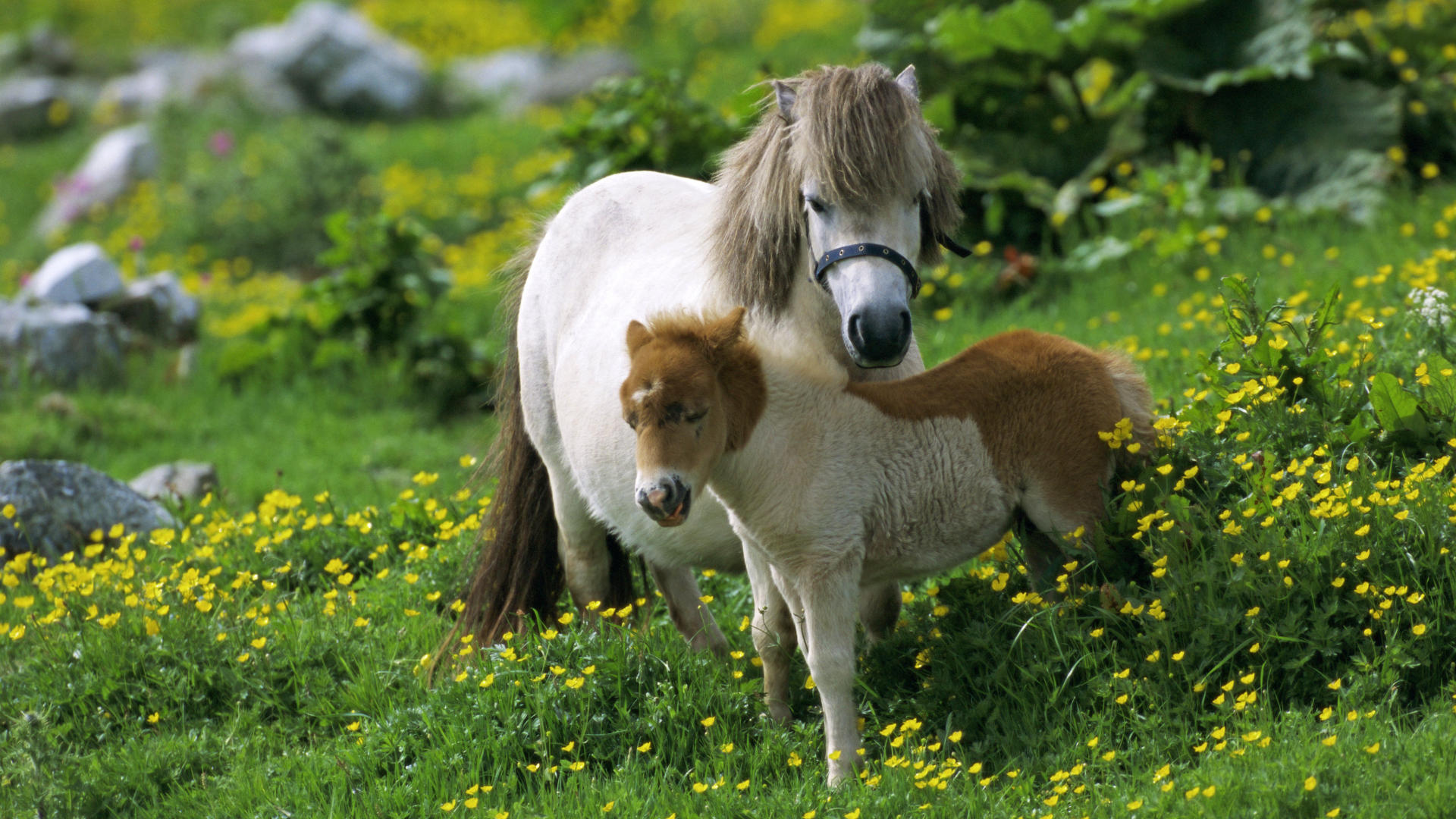
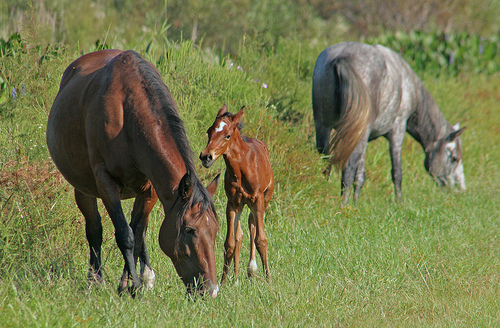


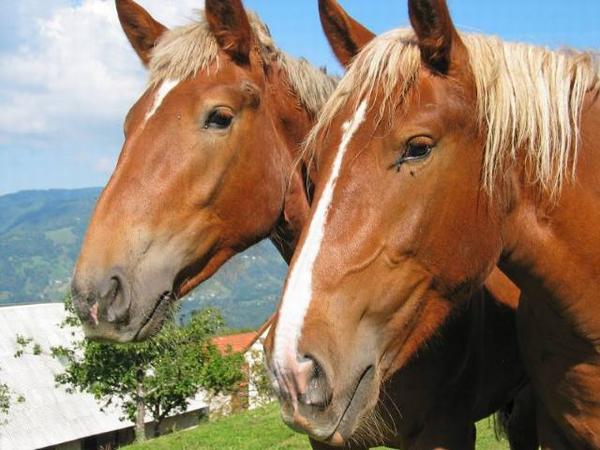
Horse
A friend of man is the beautiful horse. Even though many horses seemingly run wild on the open range the world is full of domesticated horses that man has a lot to do with their condition. There is one place, however, that has some real wild horses in Asia where the Mongolian people live. Horses are bred for man’s certain needs such as special ways of breeding for war horses, work horses, pleasure horses, and race horses. They are with all different colors and markings. There can be surprises such as miniature horses like the one that is 17 inches high. You always enjoy seeing the cute ponies that they have for the children to ride or pull sleighs with bells and wagons that rumble down the dirt roads. The largest horse recorded was more that 3,000 pounds. Some horses have been recorded to gallop at 55 miles an hour for short distances.
Horses have gaits or variations of how to walk and run. They walk, trot, canter, pace, ambling, running walk, and gallop. It’s hard for them to sleep for long lengths of time because they are always thinking of the predators that are lurking about. But they sleep standing or lying down off and on for about two hours a day.
Horses have large eyes and they have the biggest eyes of all the land animals and depend a lot on their sharp eyesight. They are very sensitive and can be very nervous if not cared for properly. They can be surprised at any sudden movement that they are not expecting and take a lung or take off running. The intelligence of the horse is quite amazing for he can be taught a lot that other animals don’t do. He is a hard worker and usually his life span is from 25-30 years but there is known to be horses to live to be about 62 years old.
He can eat about 24 pounds of food and drink 10-12 gallons of water a day. He is a good friend so take good care of him.

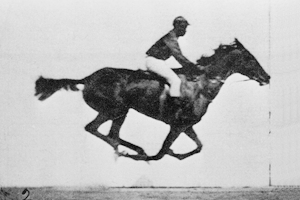
HORSES are found in every quarter of the globe, and in some countries vast herds of them run wild on the plains. These herds sometimes number many ;thou- sands, and are subdivided into several companies, each having a leader, while one acts as commander of the whole herd. This ”commander-in-chief "is able in some unaccountable way to give orders to his followers; and when moving from one grazing ground to another, the herd presents the appearance of an army, each leader heading his proper line and keeping it in order.
It is necessary for them to preserve this discipline for their protection. If they straggled off, each in a separate way, they would fall an easy prey to their enemies,—the wolves, pumas, and jaguars, which sometimes attack them even when in droves.
In Tartary, horse-hunting is a very common sport. The animals are captured by the aid of a falcon, which is trained to settle on a horse's head, and flutter his wings about its face, until the hunter comes up to secure his prize. Not only do the
Tartars ride their horses, but they drink their milk, and eat their flesh, so that a horse-hunt is . often conducted as a food-procuring expedition.
The wild horses found on American-prairies are called mustangs. They are used mostly for saddle horses, and are extremely tough and enduring.
They are usually caught by the aid of the lasso.
This is a long rope with a slipping noose at one end.
A rider will throw a lasso quite a distance with such exactness that the noose will fall over the head of a mustang, and fasten around its neck.
The more he plunges and pulls, the tighter the noose draws; he strangles, and after a time is thrown, when he is in the power of his captor.
There are as many different kinds of horses as there are uses to which they can be put. Most noted for swiftness is the Arabian horse. Its body is very light, its neck long and arched, its eye full and soft, and its limbs delicate and slender. This class is the one generally used in England for racers. Another horse highly prized in that country is the hunter. The body of the hunter should not be so long as that of the racer, and requires greater compactness, so as not to be tired out by long rides over ploughed grounds. A comparatively large foot is required, in order to prevent its being destroyed by the rapid alternation of hard and soft ground, which the animal is required to traverse. The low shoulders of the racer would be injurious in a hunter, on account of the trying leaps, which it is often called upon to perform.
But one rarely wishes to ride more than eight or ten miles an hour, and on a journey not more than six or seven. Fast horses are not even in their speed; and although they can perform extraordinary feats, they are not good travelers on long distances. For all common uses, then, the hackney, or road horse, is far more valuable. This horse, though not speedy, is generally a pleasant traveler, and is safe, good tempered, and enduring.
A very elephant among horses is the English dray-horse. Its great size is not needed so much for the amount of pulling which it performs as to withstand the jolting or battering of the tongue or shafts that takes place on the paved streets of large cities. The dray-horse is a very slow animal, and its pace cannot be quickened even if the load be light. Its breast is very broad and its shoulders thick and upright, the body large and round, the legs short, and the feet extremely large.
The Shetland pony is the smallest of horses. It is a native of the Shetland Islands, which lie north'
of Shetland. There the ponies run wild, and may be owned by any one who,can catch them. For its size the Shetland pony is very strong, and has been known to trot forty miles in a day, with a man on its back.
The horse has from time immemorial been made the servant and companion of man. Besides being the most useful, it is also the most noble and beautiful of animals. By nature it is patient, kind, affectionate, and willing. It often shows an almost human attachment for the members of the family by whom it is owned, following them about the yard and the fields like a dog, placing its head on their shoulders as if to caress them, and allowing even the children to play around its feet, and mount its back two or three at a time: So attached does the Arabian horse become to its owner, that should be be thrown from its back, the animal will stand quietly until he gains strength to remount; and cases have been known in which, his master having been killed in battle or murdered in some wild place, the horse would stand guard over the body until, if not forcibly removed, he would himself pine away and die. The horse is also possessed of considerable intellectual power, having been trained to do very wonderful things, besides doing many clever things without being taught.
The Rev. J. G. Wood in a work on Natural History says: "The horse is mostly fierce because it is nervous, and bites and kicks, not because it is enraged, but because it is alarmed. Restore confidence, and the creature becomes quiet without any desire to use its hoofs and teeth in an aggressive manner.' There are few animals, which are more affectionate than the horse, as will be acknowledged by any one who has possessed a favorite horse, and treated it with uniform kindness.
The infliction of pain is a clumsy and barbarous manner of guiding a .horse, and we shall never reap the full benefit of the animal until we have learned to respect its feelings, and to .shun the infliction of torture as a brutal, a cowardly, and an unnecessary act. To maltreat a child is always held to be a cowardly and unmanly act; and it is equally cowardly and unworthy, of the human character to maltreat a poor animal which has no possibility of revenge, no hope of redress, and no words to make its wrongs known. Pain is pain, whether inflicted on man or' beast, and we are equally responsible in either case."
In most of .our large cities, societies for the prevention of cruelty to horses and other animals have been organized, and well named " Humane Societies." Even little children have become enthusiastic members, and have done much in their way' to help in bringing about kinder treatment for the poor, overworked horses who must daily, year in and year out, drag the street-cars, drays, and omnibuses up and down the streets, that men may ride and rest. Surely such kind servants should never receive cruelty or neglect at our hands.
C. H. G
DID BOB THINK?
BOB was an old horse on my great-grandfather's farm.
He was a very clever horse; but it is not. so much for his cleverness as for one thoughtful thing which he did, that his name has been handed down to us who live so long after him, and who never saw him.
He was very fond of children; the boys who lived near used to have many a pleasant game with Bob on sunny afternoons when he was grazing in the fields or by the roadside.
Sometimes they chased Bob, and sometimes he chased them; and it was a funny sight to see the old horse running after a troop of boys, uttering a peculiar whinny, which said as plain as words could say it, " Isn't this real fun, boys I"
One day Bob was coming slowly through the one long street of the village, dragging a loaded cart behind him.
There, right in the middle of the street, a little child was sprawling in the dust.
No one noticed it until Bob and the cart wore close upon it.
Was the child to be trodden beneath the horse's feet, or crushed beneath the broad wheel of the cart!
No; just as the mother rushed out of a doorway with a shriek, Bob stooped down, seized the child's clothing with his teeth, and laid the little one on the footpath out of harm's way.
It was done tenderly, quietly, and it was over in a moment.
Then the wise horse went on as if he had done nothing surprising.
Do you wonder that we keep Bob's memory green!
And isn't his thoughtfulness a lesson for the little boys and girls whose common excuse for carelessness which injures others is, "I didn't think"?
Bob thought; and his thinking saved a
child' s life.
S. S. Times.
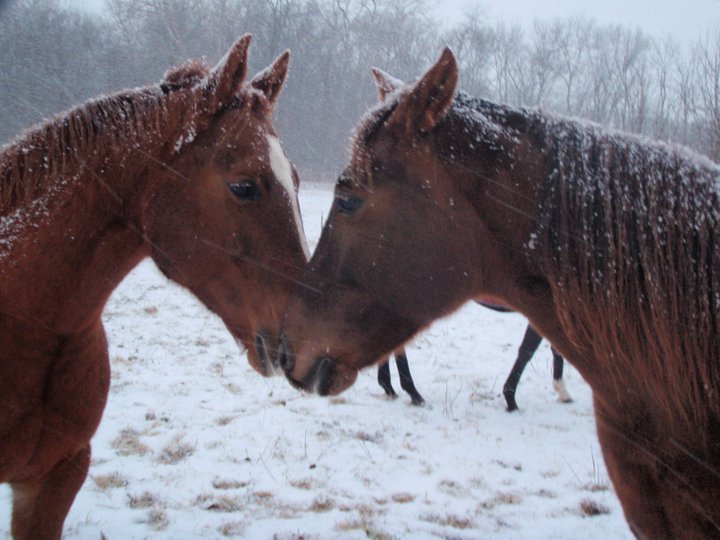

“For the horse of Pharaoh went in with his chariots and with his horsemen into the sea, and the LORD brought again the waters of the sea upon them; but the children of Israel went on dry land in the midst of the sea.”
Exodus 15:19
Horse
“After the Hebrews had been gone from Egypt some days, the Egyptians told Pharaoh that they had fled, and would never return to serve him again. And they mourned because they had permitted them to leave Egypt. It was a very great loss for them to be deprived of their services; and they regretted that they had consented to let them go. Notwithstanding all they had suffered from the judgments of God, they were so hardened by their continual rebellion that they decided to pursue the children of Israel, and bring them back by force into Egypt. The king took a very large army and six hundred chariots, and pursued after them, and overtook them while encamped by the sea.
"And when Pharaoh drew nigh, the children of Israel lifted up their eyes, and, behold, the Egyptians marched after them; and they were sore afraid; and the children of Israel cried out unto the Lord. And they said unto Moses, Because there were no graves in Egypt, hast thou taken us away to die in the wilderness? Wherefore hast thou dealt thus with us, to carry us forth out of Egypt? Is not this the word that we did tell thee in Egypt, saying, Let us alone, that we may serve the Egyptians? for it had been better for us to serve the Egyptians, than that we should die in the wilderness. And Moses said unto the people, Fear ye not; stand still, and see the salvation of the Lord, which he will show to you today; for the Egyptians whom ye have seen today, ye shall see them again no more forever. The Lord shall fight for you, and ye shall hold your peace."
How soon the Israelites distrusted God! They had witnessed all his judgments upon Egypt to compel the king to let Israel go; but when their confidence in God was tested, they murmured, notwithstanding they had seen such evidences of his power in their wonderful deliverance. Instead of trusting in God in their necessity, they murmured at faithful Moses, reminding him of their words of unbelief which they uttered in Egypt. They accused him of being the cause of all their distress. He encouraged them to trust in God, and withhold their expressions of unbelief, and they should see what the Lord would do for them. Moses earnestly cried to the Lord to deliver his chosen people.
"And the Lord said unto Moses, Wherefore criest thou unto me? Speak unto the children of Israel, that they go forward. But lift thou up thy rod, and stretch out thine hand over the sea, and divide it; and the children of Israel shall go on dry ground through the midst of the sea." God would have Moses understand that he would work for his people--that their necessity would be his opportunity. When they should go as far as they could, he must bid them still go forward; that he should use the rod God had given him to divide the waters.
"And I, behold, I will harden the hearts of the Egyptians, and they shall follow them; and I will get me honor upon Pharaoh, and upon all his host, upon his chariots, and upon his horsemen. And the Egyptians shall know that I am the Lord, when I have gotten me honor upon Pharaoh, upon his chariots, and upon his horsemen. And the angel of God, which went before the camp of Israel, removed and went behind them, and the pillar of the cloud went from before their face, and stood behind them. And it came between the camp of the Egyptians and the camp of Israel; and it was a cloud and darkness to them, but it gave light by night to these. So that the one came not near the other all the night."
The Egyptians could not see the Hebrews; for the cloud of thick darkness was before them, which cloud was all light to the Israelites. Thus did God display his power to prove his people, whether they would trust in him after giving them such tokens of his care and love for them, and to rebuke their unbelief and murmuring. "And Moses stretched out his hand over the sea; and the Lord caused the sea to go back by a strong east wind all that night, and made the sea dry land, and the waters were divided. And the children of Israel went into the midst of the sea upon the dry ground; and the waters were a wall unto them on their right hand and on their left." The waters rose up and stood, like congealed walls on either side, while Israel walked in the midst of the sea on dry ground.
The Egyptian host was triumphing through that night that the children of Israel were again in their power. They thought there was no possibility of their escape; for before them stretched the Red Sea, and their large armies were close behind them. In the morning, as they came up to the sea, lo, there was a dry path, the waters were divided, and stood like a wall upon either side, and the children of Israel were half way through the sea, walking on dry land. They waited awhile to decide what course they had better pursue. They were disappointed and enraged, that, as the Hebrews were almost in their power, and they were sure of them, an unexpected way was opened for them in the sea. They decided to follow them. "And the Egyptians pursued, and went in after them, to the midst of the sea, even all Pharaoh's horses, his chariots, and his horsemen. And it came to pass, that in the morning watch the Lord looked unto the host of the Egyptians through the pillar of fire and of the cloud, and troubled the host of the Egyptians, and took off their chariot wheels, that they drave them heavily; so that the Egyptians said, Let us flee from the face of Israel; for the Lord fighteth for them against the Egyptians."
The Egyptians dared to venture in the path God had prepared for his people, and angels of God went through their host and removed their chariot wheels. They were plagued. Their progress was very slow, and they began to be troubled. They remembered the judgments that the God of the Hebrews had brought upon them in Egypt, to compel them to let Israel go, and they thought that God might deliver them all into the hands of the Israelites. They decided that God was fighting for the Israelites, and they were terribly afraid, and were turning about to flee from them, when "the Lord said unto Moses, Stretch out thine hand over the sea, that the waters may come again upon the Egyptians, upon their chariots, and upon their horsemen. And Moses stretched forth his hand over the sea, and the sea returned to his strength when the morning appeared; and the Egyptians fled against it; and the Lord overthrew the Egyptians in the midst of the sea. And the waters returned, and covered the chariots, and the horsemen, and all the host of Pharaoh that came into the sea after them; there remained not so much as one of them. But the children of Israel walked upon dry land in the midst of the sea; and the waters were a wall unto them on their right hand, and on their left. Thus the Lord saved Israel that day out of the hand of the Egyptians; and Israel saw the Egyptians dead upon the sea shore. And Israel saw that great work which the Lord did upon the Egyptians; and the people feared the Lord, and believed the Lord, and his servant Moses."
As the Hebrews witnessed the marvelous work of God in the destruction of the Egyptians, they united in an inspired song of lofty eloquence and grateful praise. Miriam, the sister of Moses, a prophetess, led the women in music.
"Then sang Moses and the children of Israel this song unto the Lord, and spake, saying, I will sing unto the Lord, for he hath triumphed gloriously. The horse and his rider hath he thrown into the sea. The Lord is my strength and song, and he is become my salvation. He is my God, and I will prepare him an habitation; my father's God, and I will exalt him. The Lord is a man of war; the Lord is his name. Pharaoh's chariots and his host hath he cast into the sea; his chosen captains also are drowned in the Red Sea. The depths have covered them; they sank into the bottom as a stone. Thy right hand, O Lord, is become glorious in power. Thy right hand, O Lord, hath dashed in pieces the enemy. And in the greatness of thine excellency thou hast overthrown them that rose up against thee. Thou sentest forth thy wrath, which consumed them as stubble. And with the blast of thy nostrils the waters were gathered together, the floods stood upright as an heap, and the depths were congealed in the heart of the sea. The enemy said, I will pursue, I will overtake, I will divide the spoil. My lust shall be satisfied upon them; I will draw my sword, my hand shall destroy them. Thou didst blow with thy wind, the sea covered them. They sank as lead in the mighty waters.”
1SP 206-210
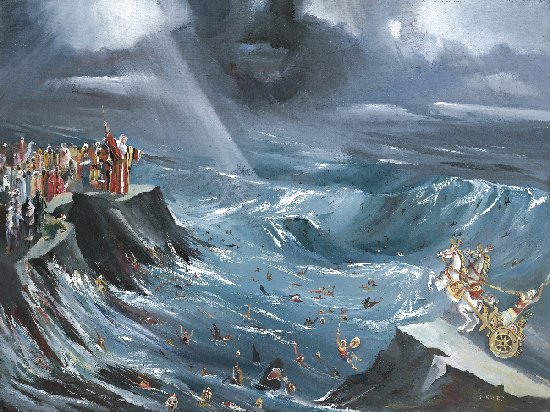
------------------------------------
“Because of the stubbornness of Pharaoh, it was decided that the voice of God, in words of command, must demand that the Israelites be set free from their life of slavery. Pharaoh refused, and the Lord punished the kingdom because the earthly ruler would not let God's people go to become a kingdom under divine rulership. Pharaoh's refusal brought many plagues upon Egypt, until the stubborn king was impelled to concede to God's plan. And then he again hardened his heart in rebellion against God, and sent his immense army to bring the Israelites back to continual service for the Egyptian ruler.
The Lord wrought wonderfully for the salvation of His people. He made a way of escape in the midst of the Red Sea. The waters were piled up as a strong wall, and a path of deliverance was made for the hosts of Israel following the leadership of Moses.
The vast armies of Egypt ventured to traverse the sea by the same path, in pursuit of Israel. A dark cloud was before them, and yet they pressed on. When the whole army--"all Pharaoh's horses, his chariots, and his horsemen"--were in the very bed of the sea, the Lord said unto Moses, "Stretch out thine hand over the sea." Israel had passed over on dry land, but they heard the shouting of the armies in pursuit. As Moses stretched out his rod over the sea, the embanked waters that had stood as a great wall, rolled on in their natural course. Of all the men of Egypt in that vast army, not one escaped. All perished in their determination to have their own way and to refuse God's way. That occasion was the end of their probation.
Thus it will be with every class who choose to refuse the light God gives, and persist in following a course of action that makes void the law of Him who is Supreme Ruler over all kings--over all human powers that oppose themselves to the law of the Supreme Ruler of the universe, and set themselves in array against the expressed will of the great I AM”.
21MR 64-65
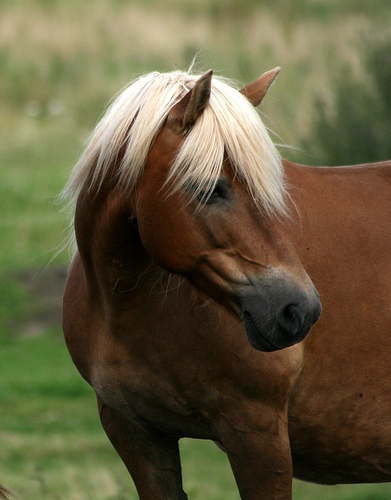
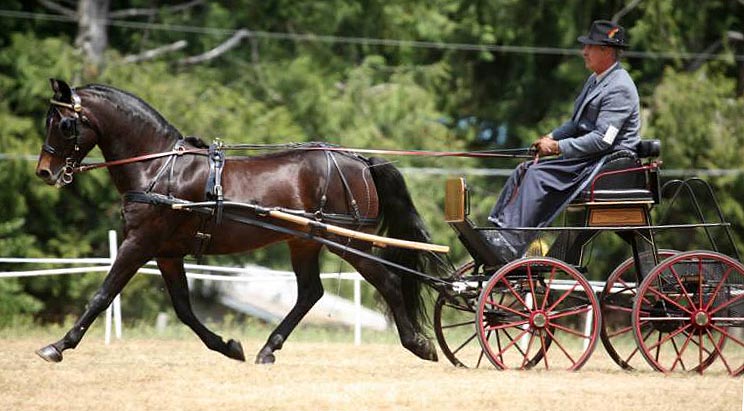
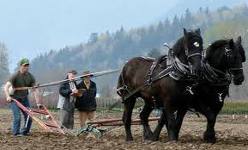
"Arabia, in the opinion of the naturalist, is the genuine and original country of the horse; the climate most propitious, not indeed to the size, but to the spirit and swiftness of that generous animal. The merit of the Barb, the Spanish, and the English breed, is derived from a mixture of the Arabian blood; and the Bedoweens preserve with superstitious care the honors and the memory of the purest race. These horses are educated in the tents, among the children of the Arabs, with a tender familiarity, which trains them in the habits of gentleness and attachment. They are accustomed only to walk and to gallop; their sensations are not blunted by the incessant use of the spur and whip; their powers are reserved for the moment of flight and pursuit; but no sooner do they feel the touch of the hand or the stirrup, than they dart away with the swiftness of the wind."
1901 ATJ, GNT 64